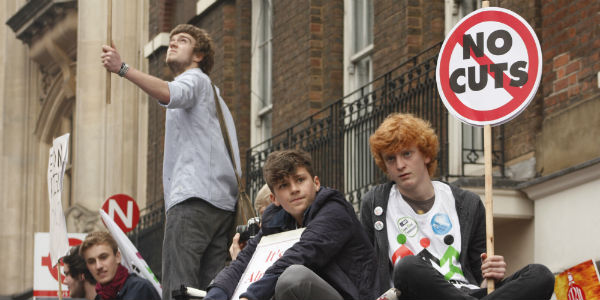Votes at 16: we need a proper conversation about when adulthood begins
The vexed question of whether people should be allowed to vote from the age of 16 has returned to the Commons with Jim McMahon MP’s Private Member’s Bill. Many argue – citing the Scottish independence referendum – that it would provide a democratic stimulus. Yet the evidence for that is lacking, say Andy Mycock (University of Huddersfield) and Jon Tonge (University of Liverpool). Citizenship education in schools is patchy. There is no GCSE in politics. We need to engage in a broader debate about when adulthood really begins, and with it the right to drink alcohol, drive or serve on a jury, as well as vote.

Young marchers pause on a bus stop in Whitehall during an anti-austerity demonstration in 2011. Photo: Weldon Kennedy via a CC BY 2.0 licence
The recent House of Commons debate on whether to lower the voting age across the UK was deeply disappointing. Those in favour of change were frustrated by a filibuster, thwarting Jim McMahon’s Private Member’s Bill. That such an important issue merited a few short speeches on a Friday afternoon in a sparsely-attended chamber must have reinforced the widely-held perception amongst young people that their interests and aspirations are peripheral to many politicians. But while opponents of change might have congratulated themselves, they must realise that the issue of voting age reform will not disappear.
The origins of the case for votes at 16 lie in fears of widespread youth political disengagement. However, the potential for a lowering of the voting age across the UK was strengthened considerably by the extension of the franchise to 16 and 17 year-olds in the 2014 Scottish independence referendum. Many young people exercised their new democratic right. The UK government subsequently empowered the Scottish Parliament to lower the voting age for all devolved elections. The Wales Act 2017 offers similar possibilities for Wales.
The growing differences in the voting age in Britain – and some city regions would like control of the franchise – has highlighted the difficulties of agreeing on political, economic and social rights across an increasingly devolved and multi-layered state. McMahon’s Bill failed amid to an increasing febrile and divisive ‘politics of youth enfranchisement’ in Westminster. Most political parties now support ’votes at 16’, as do an increasing number of youth-focused and democratic reform-oriented non-governmental organisations. But although there is no countervailing pressure group or coalition opposing a reduction in the voting age, the two parties at Westminster which oppose lowering the voting age, the Conservatives and the Democratic Unionist Party, are both in government.
Given that the parties supporting voting age reform appear to be most likely to benefit from such a move, there may be an element of self-interest in their position. Indeed, age cohort proved the most important demographic at the 2017 General Election. Nevertheless, the case for lowering the voting age is advanced on universalistic rather than particularistic grounds, often framed in terms of a broader democratic stimulus. This approach has encouraged a small, but increasingly vocal, number of Conservative MPs to express support for lowering the voting age.
Two UK government-sponsored independent commissions have reviewed the voting age – but some time ago. In 2004, the Electoral Commission concluded 18 was appropriate. In 2009, the Youth Citizenship Commission (YCC) – on which we both served – was tasked with increasing young people’s political participation. Consideration of voting age reform appeared a governmental ‘bolt-on’ but a Commission charged with the task of increasing young people’s involvement in politics could hardly ignore the growing debate regarding ‘votes at 16’.
The YCC declined to recommend a lowering of the voting age, noting a lack of evidence either way. It noted that the quality of evidence in favour of change submitted to the Commission was sometimes poor, often grounded in imprecise arguments concerning human rights or based upon pressure group polemic rather than reasoned case. Judging by last Friday’s debacle, little has changed. Moreover, polling undertaken by the YCC indicated that while a majority of 16 and 17 year olds supported voting age reform, all categories aged 18 and above were opposed.
The YCC’s proposition that Westminster should lead ‘a national discussion’ on lowering the voting age and hold a free vote in the House of Commons was also recommended by a Political and Constitutional Reform Committee report published in late 2014 on ‘Voter engagement in the UK’. The problem is that there has been no ‘national discussion’, little serious evidence-gathering, and scant intelligent debate.
Although McMahon’s bill will return to the House on December 1, it is unlikely to receive time for further consideration that day. On current evidence, there is little to suggest the politicisation of voting age reform will abate when the House considers Peter Kyle’s bill on the same topic in May 2018. With Prime Minister Theresa May opposed to ‘votes at 16’, it is likely that informed and objective consideration of this important issue will be kicked into the ‘parliamentary long grass’.
Nonetheless, there is an urgent need to adopt an evidence-based approach when considering such an important matter. There is very limited existing research regarding the form and strength of political and public opinion on the issue – and much of this is now outdated. Westminster can now at least look at Scotland and the other small minority of countries where the voting age is below 18 – and those that have declined to lower the age of enfranchisement.
The fragmented and asymmetric provision of democratic education across the UK needs to be considered in the context of voting age reform. There is no GCSE in politics, and citizenship education is patchy and subject to significant national variation. Opportunities for young people to participate in youth representative politics prior to enfranchisement are also inconsistent both in their schools and local communities.
Voting age reform needs to be considered in the broader context of when we as a society believe that children – as citizens under the age of 18 are defined by the United Nations – should acquire rights and responsibilities. The issue of whether a 16 year-old should be prohibited from serving on a jury, standing as a candidate in an election, driving, or buying an alcoholic drink yet allowed to vote deserves better than a desultory Friday afternoon debate.
It is time for a full, evidence-led inquiry into the age not just of enfranchisement, but of adulthood. We therefore urge both advocates and opponents to come together and establish an independent and non-partisan Youth Commission to consider whether it is time to universally enfranchise 16 and 17 year olds across the UK.
This post represents the views of the authors and not those of Democratic Audit.
 Andy Mycock is Reader in Politics at the University of Huddersfield was a member of the Youth Citizenship Commission under the last Labour government.
Andy Mycock is Reader in Politics at the University of Huddersfield was a member of the Youth Citizenship Commission under the last Labour government.
 Jon Tonge is Professor of Politics at the University of Liverpool and was Chair of the Youth Citizenship Commission under the last Labour government.
Jon Tonge is Professor of Politics at the University of Liverpool and was Chair of the Youth Citizenship Commission under the last Labour government.





 Democratic Audit's core funding is provided by the Joseph Rowntree Charitable Trust. Additional funding is provided by the London School of Economics.
Democratic Audit's core funding is provided by the Joseph Rowntree Charitable Trust. Additional funding is provided by the London School of Economics.